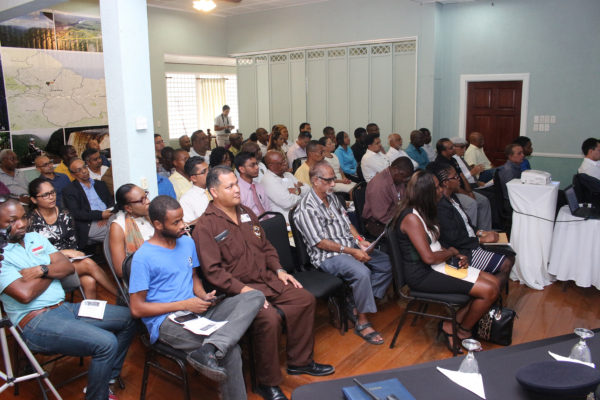Calling gun crimes the “most pressing problem” facing the country, ex-army Chief-of-Staff Brigadier General (rtd) Mark Phillips yesterday urged collaboration with the police to ensure safety and security.
Phillips, who retired as Chief-of-Staff of the Guyana Defence Force (GDF) earlier this month, was at the time addressing a security forum and expo organised by the Georgetown Chamber of Commerce and Industry (GCCI).
“Notwithstanding the statistics that speak to a reduction in crime… It is my firm belief… that the high incidence of gun-related crimes is today the most pressing problem in our Guyanese society,” he told those gathered for the forum and expo at the Duke Lodge in Kingston.

He made it clear that he was not trying to cast blame on the police for the less-than-desirable crime situation.
“No one is safe from violent crimes and criminal activities,” he, however, said, while adding that it is therefore in this dynamic security context “we have to collaborate and cooperate, the public and private sector, civil society and the media to collectively ensure our security and safety and to exploit opportunities to safeguard our national interest especially the interest of promotion of economic development of Guyana.”
He spoke of the need to move away from cash transactions, which would “minimise… vulnerability to criminal action,” while noting that he is aware of the efforts and investment by government over the last ten years to improve the security structure and ability to solve crimes in Guyana.
He opined that there are six challenges likely to drive Guyana’s security priority for the next five to ten years that would continue to have immediate and long-term implications for development: violent crime; territorial integrity; illicit trafficking, especially in drugs, small arms, counterfeit goods and in persons; transnational organised crime; terrorism; and cybersecurity/cybercrime.
Assistant Commissioner Paul Williams, who also addressed the forum, advanced a similar position, while saying there needs to be partnerships with the police if crime and security are to be effectively tackled. He informed that the police have incorporated technology into their security apparatus and have also been exchanging ideas with those in the security sector, including the Guyana Association of Private Security Organisations (GAPSO).
Williams said the force has looked at numerous security ideas and has had some success with CCTV, the Integrated Ballistic Information System (IBIS), body pack cameras—which are being used at certain events especially when dealing with public order—and the analysis of computer data.
According to Williams, the force has a computer centre, which provides training for ranks in all three counties, as well as some free services to members of the public. He said too that the police are trying to utilise the e-governance set up.
He stressed that the business community has a great role to play, since unlike the police, it has no financial restrictions. He said while there is no stamping out of crime, “we can get on top of it,” through collaborative efforts and the sharing of information.
True sense of security
Noting that security concerns create a barrier to local and foreign direct investment, GCCI President Vishnu Doerga urged that business owners and the general public be proactive in safeguarding themselves against criminal threats.
Doerga said that in the GCCI’s 2013 competitiveness manifesto, the absence of a comprehensive security sector reform was identified as one of 20 barriers to Guyana’s competitiveness.
“We actually stated that the security of all citizens should be of the highest priority; that duty, along with the obligation to preserve integrity, security and authority of the nation, comprises the cornerstones for a competitive, confident and equitable Guyana,” he said.
According to Doerga, the incidence of crime and its related perceptions serve to “decompress and suppress the economic climate and that impact consequently affects consumer and business confidence… and magnify cost burdens for business.”
Thus, the GCCI recommended a review of the entire national security sector with the aim of restructuring, upgrading and enhancing the security apparatus. He said the GCCI acknowledges the movement towards modernity, but stands by its call for a review with the intent of ensuring the delivery of a “true sense of security” for all citizens and visitors.
Earlier this year, the GCCI commenced discussions with the Ministry of Public Security and the police to look at ways to improve security.
Doerga said yesterday’s event was one of the Chamber’s efforts to contribute to a secure environment, though there is much to be done before there is true peace of mind when it comes to the security situation in Guyana. In the meantime, he said, the GCCI calls for the complete removal of duties and VAT on all security management products. At the moment, duties range from 25% to 30% on the different components coupled with the 16% VAT. “I would urge those in power to consider the loss in revenue generated by these taxes against… benefits,” Doerga said.
The security forum covered traditional, physical and cyber security. Leading suppliers and distributers were on hand to advise and educate those present on security technologies and solutions including video surveillance equipment and accessories and IT communications among others.




